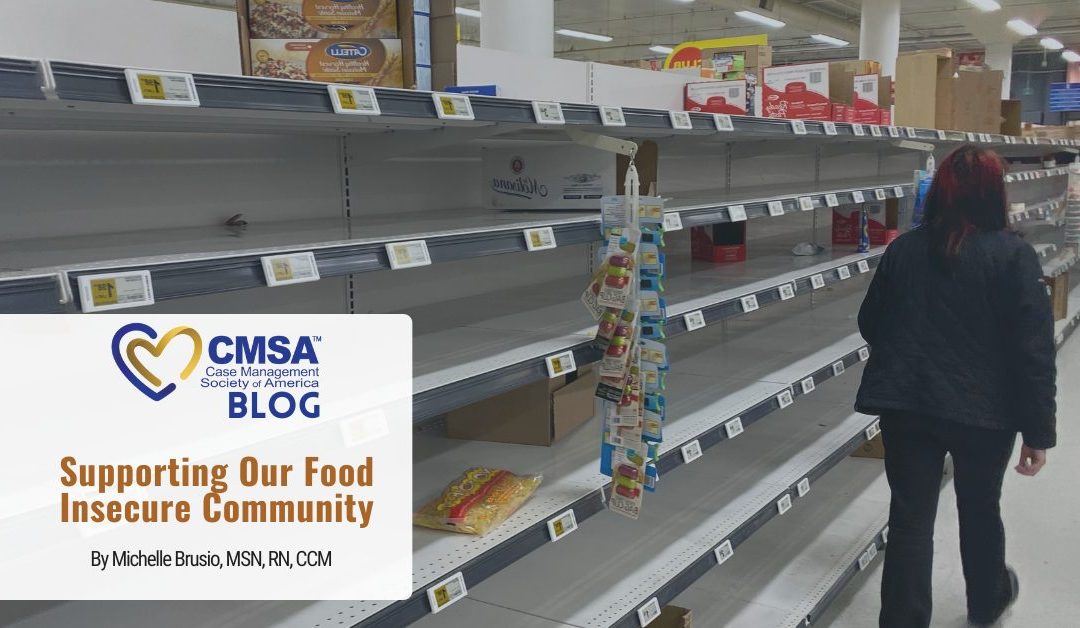By Michelle Brusio, MSN, RN, CCM
To address food insecurity in our community, our Care Transformation Team delivered twenty-five Community Supported Agriculture (CSA) seasonal fruit and vegetable boxes this past summer/fall to patients in need. The boxes were delivered every two weeks for 6 months. Our goal was to touch 50 lives however, we were able to touch 150 lives with this project and wanted to share our learnings from this initiative.
We partnered with a local farm in our community to provide the boxes.
Farmer Allison took extra care of our boxes to ensure a variety of fruits, vegetables, and herbs for our primarily elderly population. The boxes were beautiful and plentiful. At Thanksgiving, the CTT and Allison agreed to add a turkey breast, a pint of milk, and a tiny pie to the boxes to make them special. It was also great to see other local farmers’ products supported in the boxes.
Our Community Health Workers (CHWs) led the charge by identifying patients with food insecurity. This could be patients who didn’t have food, had limited food due to reduced food stamp benefits, or needed to have the right foods to manage chronic conditions. We coordinated delivery dates and times as well as delegated deliveries to the rest of the team as we delivered each box to our patients. All patients also received freezer bags, a bag of toiletries and a feedback survey.
We were also mindful of supplying recipes as not everyone knew how to cook kale or squash.
Healthy Harford, a non-profit organization associated with Upper Chesapeake Health, added to our initiative and obtained broths, no salt seasonings, and some shelf-stable products to place in the boxes. This helped us greatly with finding and providing recipes. They also assisted us daily in finding food and other resources for the Care Transformation Team. We also had some help delivering the boxes from our Community Outreach Department and Senior Leadership.
What Did We Learn From This Initiative?
Through our conversations with patients and the many surveys we received back, we learned that patients were truly grateful, and the deliveries were more than just food boxes. Patients felt loved and heard and said that these boxes brightened their day. Patients expressed gratitude for a lowered grocery bill and that they would like to continue to receive these boxes. Patients also shared their boxes with neighbors who were not eligible for our program.
The team learned that kindness goes a long way and that we take simple things, like biting into a peach, for granted. The work of this project may sound tedious and time-consuming, but the benefits were many including the patients' gratitude and for some, a positive change in their mental health due to a caring voice on the phone and company received on delivery days.
Next Steps
We will continue to partner with Farmer Allison plus investigate more ways to support our patients in the off seasons — after the holidays and through the winter months there is a greater need for food. We hope to have more support to deliver the boxes and for those that have good mobility and possibly need the social time with others, we hope to work with Farmer Allison to have patients go to the farm stand to choose the contents of their boxes. We will also be working on care packages and information on food banks through our primary care programs such as an Annual Wellness Visit.
Our program addressed several Social Determinants of Health (SDoH) including food insecurity, loneliness and social isolation, transportation, and helping with income. The Care Transformation team addresses SDoH daily and educates patients on chronic diseases, medications, and social needs. This project demonstrated the team’s skills, compassion, and resilience in caring for others. Most of all this team learned a great deal in being humble. As their manager, I am extremely proud of their work each and every day and look forward to what else we can accomplish.
Our Care Transformation team is comprised of Nurses, Community Health Workers (CHWs), Care Coordinators, a Pharmacist, and a Social Worker. We work with Medicare part B patients attributed to Primary Care providers within The University of Maryland Upper Chesapeake Health. We are embedded in the primary care offices and will meet patients in their homes, a local restaurant, or at an appointment. The CTO does receive monies to address SDoH needs through the Maryland Primary Care Program and the Centers for Medicare and Medicaid.
Join CMSA on January 17, 2024 @ 1pm ET for “How It Started vs. How It's Going in Healthcare Today!“ Register Now: https://www.pathlms.com/cmsa/courses/61847 CMSA's Public Policy Chair, Susan Plough, and guest panelists, Dr. Ronald Hirsch and Cheri Lattimer will explore the post-pandemic changes in patient care, insurance, population health, access to care, and telehealth. How has healthcare transformed, and what challenges lie ahead? Don't miss this opportunity to stay informed about the current state of healthcare!
Bio: Michelle Brusio MSN, RN, CCM is the Clinical Manager, Population Health Care Transformation Organization at University of Maryland, Upper Chesapeake Health. She is a member of CMSA. She has experiences in Payer, Acute Care, Outpatient and Primary Care Case Management.


A valuable initiative from this team! Very interested in hearing their next steps as they address food insecurity in the identified population.